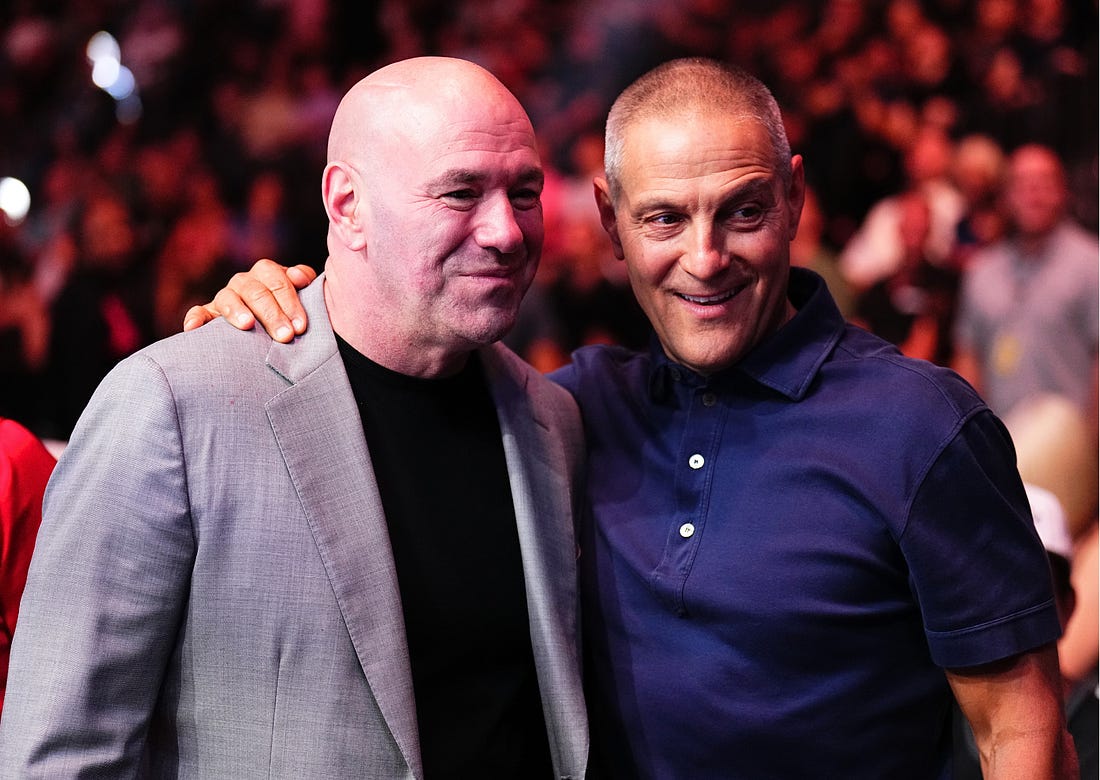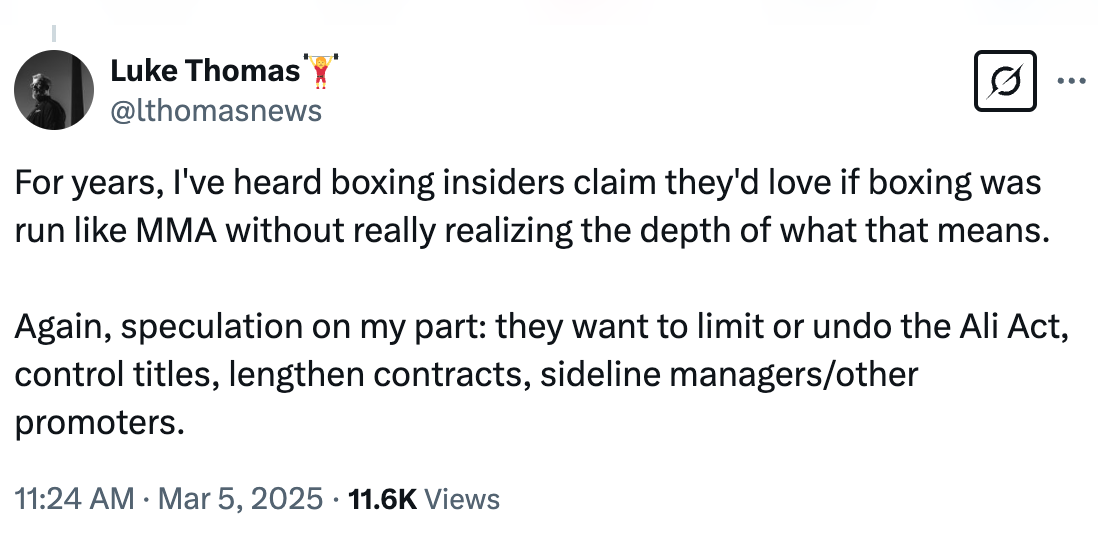Dana White has officially entered boxing, securing TKO a $10 million annual payday
After years of speculation and rumors, the worst-kept secret in sports is official; UFC President Dana White is teaming up with Saudi Arabia to launch a new boxing league. There is still a lot to figure out. The boxing league doesn’t yet have a name, has not signed any fighters, and has no media rights deal, sponsorship contracts, or arena hosting agreements. But here is everything that we know about the new league so far:
The easiest way to think about this new league is that it will essentially apply the UFC model to boxing. Dana White says the league will sign 150 to 160 boxers in multiple weight classes, each with their own belt. Similar to the UFC, there will also be a transparent rankings system and events held worldwide, leveraging tourism budgets. “I’m going to take this thing everywhere,” Dana White told the Associated Press. “We’re going all over the US. We’re going to Mexico, Canada, Brazil, Australia, the UK. The list goes on. Just like UFC. You can’t build a boxing business without America. You have to have the United States to have a truly successful sport.” Many people have already started to downplay yesterday’s announcement. Launching a new league without a name will do that. However, I actually think this is a big deal and people like Ariel Helwani agree, making his thoughts clear on his show yesterday. “Boxing as we know it is going to change. This is seismic. This is massive. This is mammoth. It is gigantic. And TKO just got a hell of a lot bigger and stronger.” Boxing is a unique sport because it’s already incredibly popular but still has a lot of opportunity. The problem is that the structure is so confusing. The average sports fan has no idea how boxing works. No commissioner or single governing body is ensuring the sport grows over time, and there are vultures at every corner, as promoters solely want to maximize earnings without ever reinvesting any money back into the sport. Boxing has multiple organizational sanctioning bodies, like the World Boxing Council (WBC), the International Boxing Federation (IBF), the World Boxing Association (WBA), and the World Boxing Organization (WBO). This system means there are typically multiple champions across the same weight classes, and the fragmented approach makes it nearly impossible to schedule best-on-best fights consistently. For example, there are currently four different welterweight champions: Eimantas Stanionis (WBA), Mario Barrios (WBC), Jaron Ennis (IBF), and Brian Norman Jr. (WBO). The same can be said about several other weight classes, and it gets even more confusing when interim belt holders are added due to a fighter getting injured or sick. Even boxing purists would admit that the UFC model is better than boxing. Rather than allowing fighters, managers, and promoters to determine what fights occur, the UFC actually has a brand. Its rankings system lets fans know exactly where each fighter stands at any given point, and when a champion is crowned, that’s the end of the story. There are no ifs, ands, or buts; that person is the undisputed champion. The major difference between boxing and the UFC (and a big reason why the UFC model has never been applied in the past) is the Muhammad Ali Boxing Reform Act. Enacted in 2000, the Ali Act aims to protect professional boxers from unfair business practices. It prohibits coercive contracts from promoters (i.e., Promoter A can’t force Promoter B’s fighter to sign a long-term deal with Promoter A so they can fight Promoter A’s boxer). The Ali Act also doesn’t allow promoters to compensate any employee of a sanctioning body, which has essentially stopped boxing promoters from creating their own belts and titles. And the Ali Act also requires the disclosure of all earnings generated by a promoter for a fight that a boxer is involved (e.g., Eddie Hearn has to disclose all of the event earnings to Anthony Joshua for a fight he headlines). The UFC has spent millions and a lot of time ensuring that the Ali Act doesn’t apply to its organization, and TKO Chairman Ari Emmanuel has even hinted in the past that they might try to reduce its influence or eliminate it for their new boxing league. Some have speculated that Dana White’s relationship with President Trump could play a role here, but that is unlikely. Amending the Ali Act would require a change in federal law, and while the law has complicated the sport, boxers are making more money than ever, making it tough to argue that it’s been a net-negative for everyone. That’s not to say the new boxing league can’t be successful without getting rid of the Ali Act. It would just be much easier to be successful if TKO was able to control titles, sign multi-year contracts, and dictate what fights get made, similar to the UFC model. Even if TKO and its partners can’t influence a change in the Ali Act, this still feels like a seismic shift in the boxing landscape. TKO already controls two of the world’s most popular sports properties: WWE and the UFC. They can potentially collaborate to host events, and don’t be surprised if the media rights are sold as a package deal. The other interesting angle is that Saudi Arabia’s Turki Alalshikh owns The Ring magazine. The Ring is a boxing publication, not an official sanctioning body, but it releases its own rankings and has awarded its own championship titles for 100 years. Saudi Arabia has already spent billions of dollars on boxing megafights over the last decade, and its participation in the project ensures the league has plenty of money for the foreseeable future. As for TKO, this is a win-win. They get a guaranteed payment north of $10 million annually and can make even more money through equity if things go well, potentially unlocking the public company’s next significant growth channel. If you enjoyed this breakdown, share it with your friends. Huddle Up is a 3x weekly newsletter that breaks down the business and money behind sports. If you are not a subscriber, sign up and join 130,000+ others who receive it directly in their inbox each week. You’re currently a free subscriber to Huddle Up. For the full experience, upgrade your subscription.
© 2025 |


